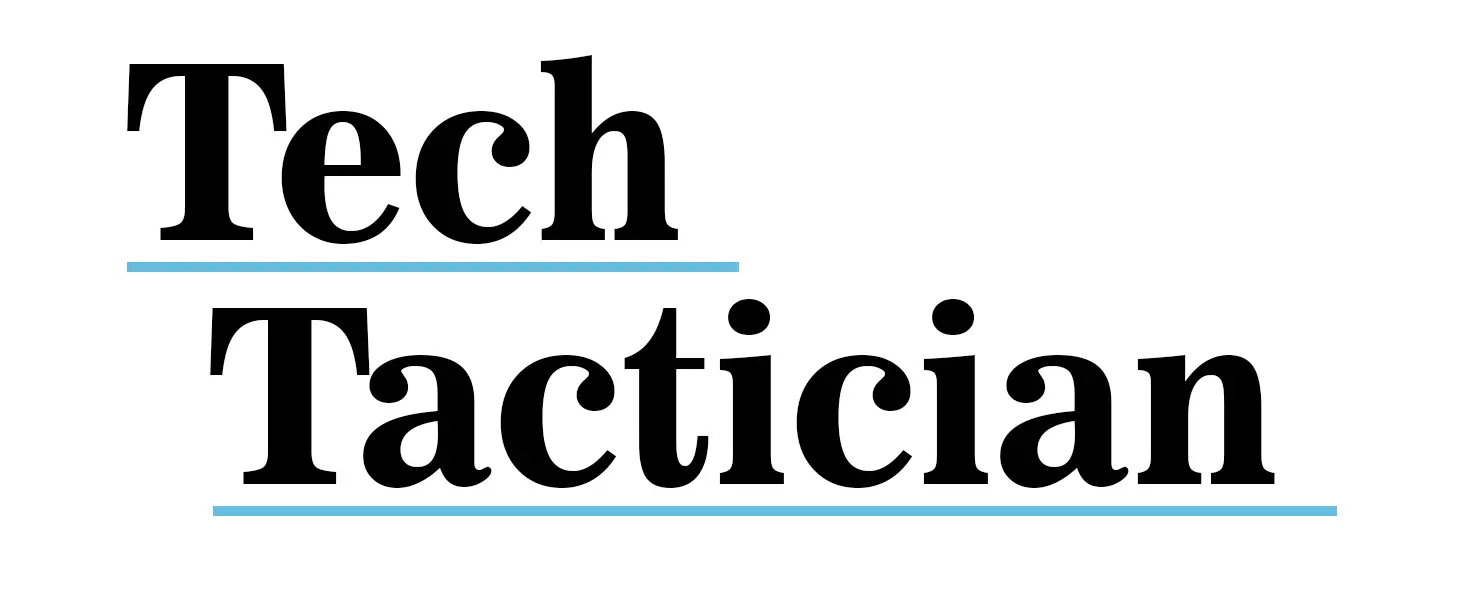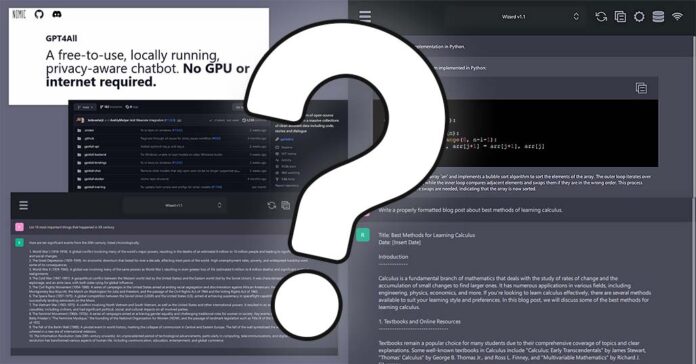Can you run ChatGPT-like large language models locally on your average-spec PC and get fast, quality responses while maintaining full data privacy? Well, yes, with some distinct advantages over traditional cloud-based LLMs and GPT models, but also, some important drawbacks. The best part is, the core tool is absolutely free, and with the help of Gpt4All you can try it right now! Let’s get right into the tutorial!
Check out also: How To Use Okada Live Voice Changer Client RVC With Discord – Quick Guide
What Is Gpt4All Exactly?
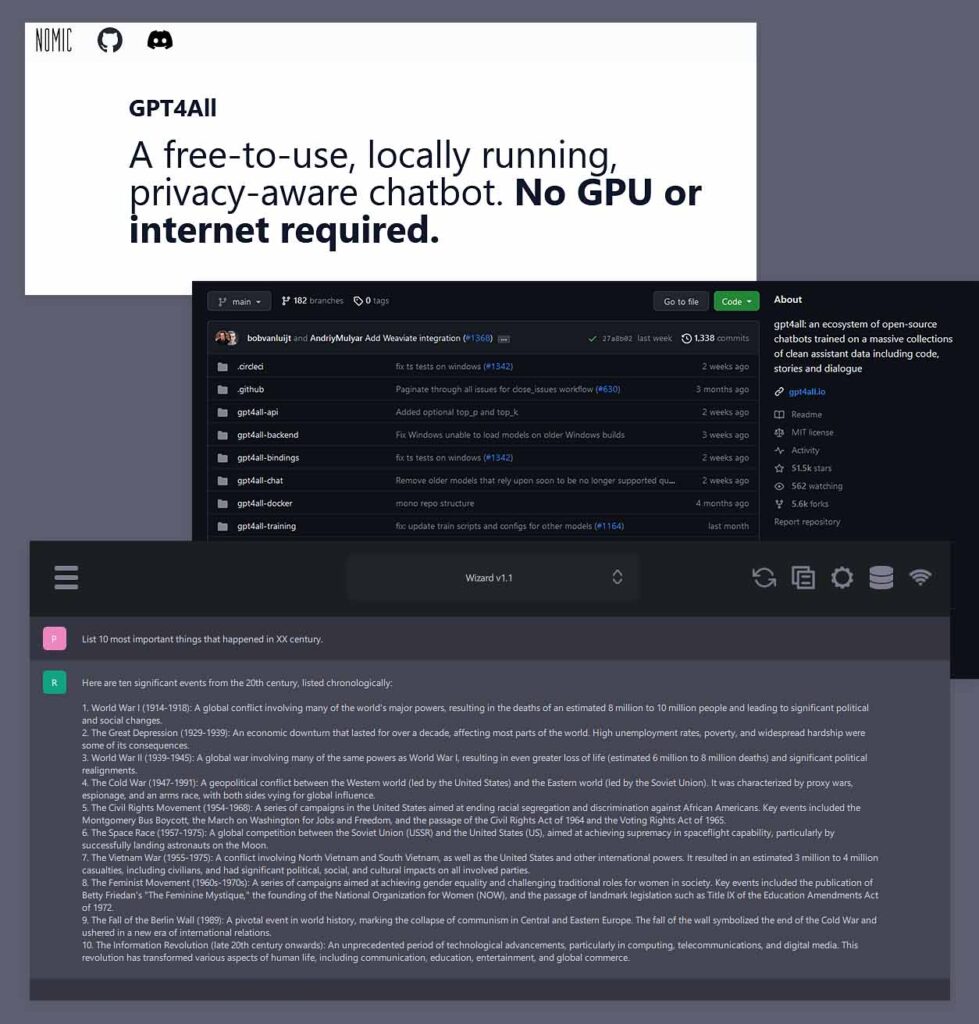
Gpt4All gives you the ability to run open-source large language models directly on your PC, no active internet connection or data sharing required for use.
Developed by Nomic AI, Gpt4All allows you to run many publicly available large language models (LLMs) and chat with different GPT-like models on consumer-grade hardware (your PC or laptop).
What this means is that it lets you enjoy a ChatGPT-like experience locally on your computer, relatively quickly, and, crucially, without sharing your chat data with any 3rd parties.
Gpt4All is available for Windows, macOS (including native support for Apple Silicon with Metal), and Linux operating systems.
The exact installation instructions are available on the official Gpt4All website, as well as its official GitHub page. Hint: It has a simple one-click installer, so you don’t have to mess around with console commands or anything like that to get it working right away!
What Is Gpt4All Capable Of?
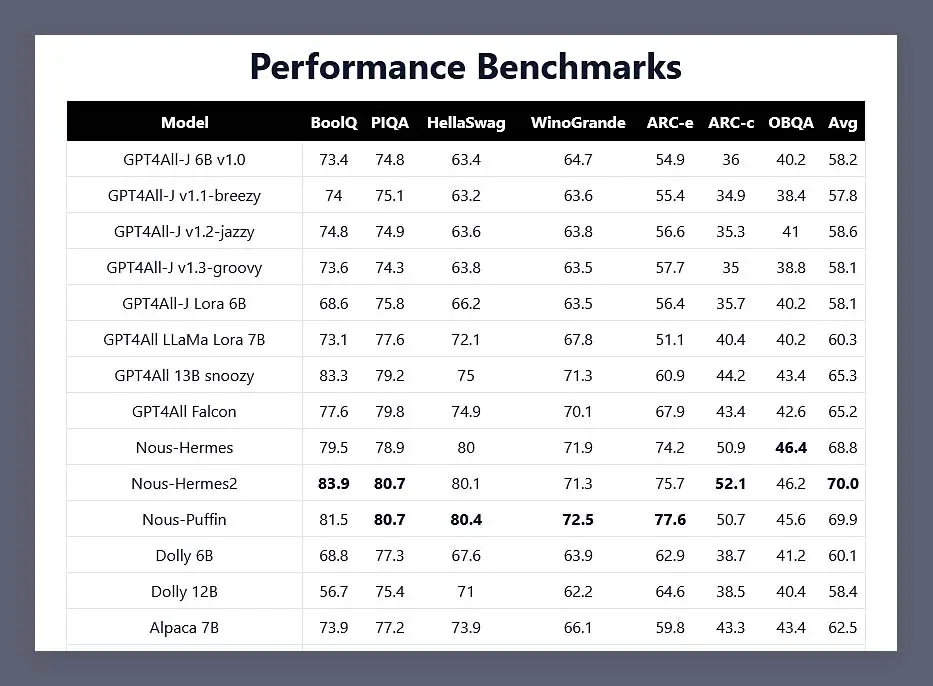
The direct answer is: it depends on the specific language model you decide to use with it. There are many free, open-source language models available for download both through the Gpt4All interface and on their official website. We’re going to elaborate on this in a short while.
Each of these models is trained on different datasets and is capable of providing you with varied outputs, both in terms of style and overall quality.
You can use Gpt4All as your personal AI assistant, code generation tool, for roleplaying, simple data formatting, and much more – essentially for many different purposes you would normally use other local LLMs or ChatGPT for.
Which Language Models Can You Use with Gpt4All?
Gpt4All is constantly being updated to support a wider range of open-source LLM architectures. Currently, Gpt4All officially supports architectures like GPT-J, LLaMA, MPT, Falcon, Replit, StarCoder, and more modern models like Mistral and Llama 3.
The main differences between these model architectures are the licenses they utilize (some are open for commercial use, others are not) and their slight performance variations.
Now, let’s get to the actual models that are available to you right away after visiting the official Gpt4All website, or straight from the Gpt4All GUI.
Available Free Language Models
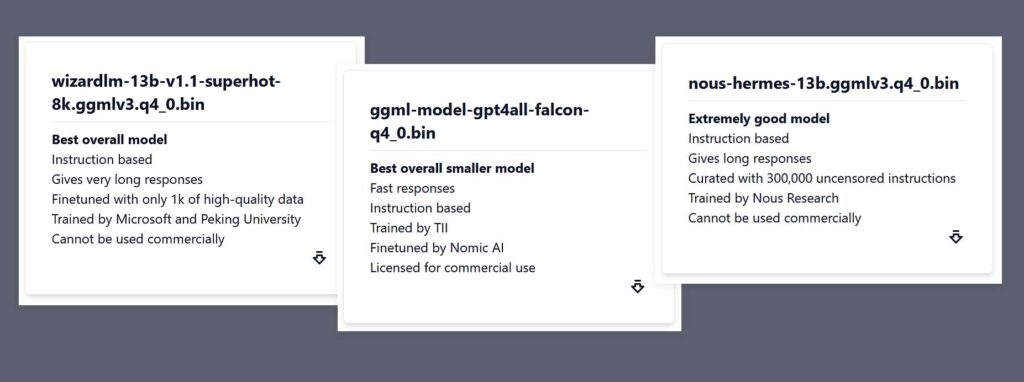
There are many different free models to choose from, all of them trained on different datasets and possessing different strengths. The models are usually around 3-10 GB files that can be imported into the Gpt4All client. A model you import will be loaded into RAM during runtime, so make sure you have enough memory on your system (8GB minimum, 16GB or more advised).
The Gpt4All client now primarily makes use of the newer GGUF (GPT-Generated Unified Format) files, which have largely superseded the older GGML format files. The GGUF format is an improved standard designed for faster loading, better extensibility, and even includes built-in metadata like prompt templates, making models easier to use across different applications.
The most popular models you can use with Gpt4All are all listed on the official Gpt4All website and are available for free download. Here are a few examples of models that have been or remain popular in the ecosystem:
- Mistral-based Models: Models like Mistral OpenOrca have gained significant popularity, offering great performance and often serving as a current default choice, especially when combined with GPU acceleration.
- Wizard LM (e.g., wizardlm-13b…): Deemed an excellent performing model by Nomic AI in the past, often known for its helpfulness.
- Hermes (e.g., nous-hermes-13b…): A high-quality model, known for long and concise responses.
- Ggml Gpt4All Falcon (e.g., ggml-model-gpt4all-falcon…): A smaller model fine-tuned by Nomic AI.
- LLaMA2 (e.g., llama-2-7b-chat…): Trained by Meta AI, this model family is optimized for dialogue and is generally allowed for commercial use.
- …and many more!
Each of these has its own upsides and downsides and can be used to get vastly different outputs from the very same prompts and generation settings. Download a few and try for yourself – all of these are available for free!
Is Gpt4All Similar To ChatGPT?
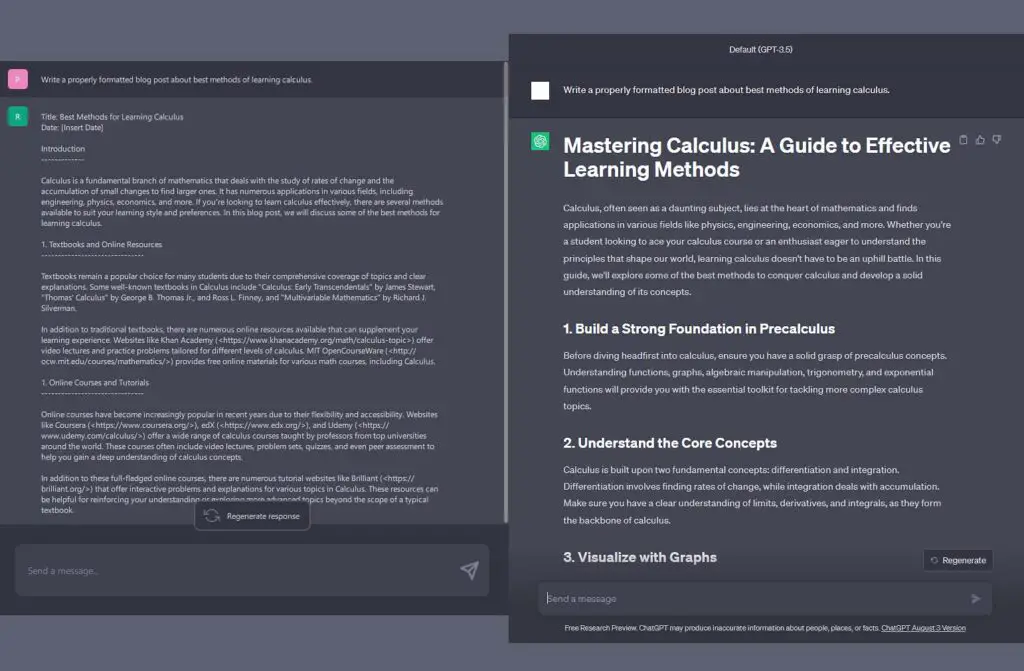
Although ChatGPT and Gpt4All operate by the same principle, there are some important differences between the two.
In a sense, yes, they are similar. They are both chat interfaces for large language models. However, it is important to acknowledge that the current state-of-the-art proprietary models (like the GPT-4o model that is now the generalist default for ChatGPT) will in most if not all cases be far superior in overall quality and instruction-following to many smaller open-source models that Gpt4All uses.
Just like with ChatGPT, you can attempt to use any Gpt4All-compatible model as your smart AI assistant, roleplay companion, or neat coding helper. Just be aware that, for now, you may not always expect an identical output quality to the latest commercial solutions for every single query or prompt.
So in short, while both Gpt4All and ChatGPT are AI assistants based on large language models, their output quality with the same input prompts supplied will differ, sometimes by a lot. Still, the main advantages of Gpt4All are the privacy, cost, and ability to fine-tune the experience with various open models.
Privacy Concerns – Is Gpt4All Offline?
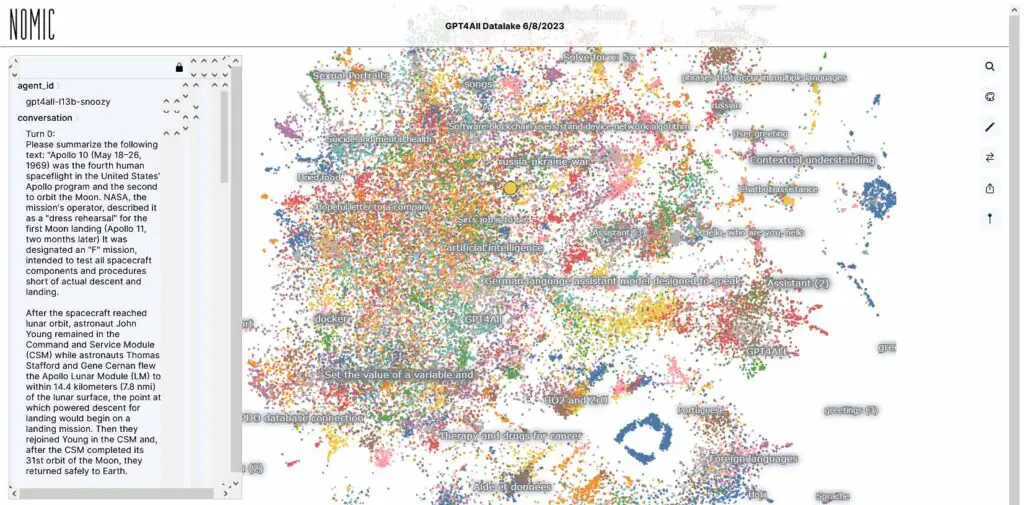
Privacy is really important for many people engaging in conversations with various AI assistants. The truth is that every bit of data shared in a non-offline conversation with an LLM-based AI assistant such as ChatGPT has to be shared with the service provider’s server and processed outside of your machine. Only then can the generated answer to your query be sent back to you over the internet. It’s different when it comes to locally run models.
Different companies selling access to their online AI tools have different data protection and handling policies, and different ways of dealing with further model training and fine-tuning using the user-generated data. To see what OpenAI (and therefore ChatGPT) does with your conversation data on a regular basis, you can take a look at their official privacy policy statement.
Gpt4All, on the other hand, processes all of your conversation data locally, that is, without sending it to any other remote server anywhere on the internet. In fact, it doesn’t even need an active internet connection to work if you already have the models you want to use downloaded onto your system!
The Gpt4All client, however, has an option to automatically share your conversation data, which will later be used for language model training purposes. If you care about your conversation data not being leaked anywhere outside your local system, be sure that the option for contributing your data to the Gpt4All Opensource Datalake is disabled, as it should be by default (see the image above).
Here is a citation from the Gpt4All Opensource Datalake statement which you can see near the data sharing option in the related setting menu:
NOTE: By turning on this feature, you will be sending your data to the GPT4All Open Source Datalake. You should have no expectation of chat privacy when this feature is enabled. You should; however, have an expectation of an optional attribution if you wish. Your chat data will be openly available for anyone to download and will be used by Nomic AI to improve future GPT4All models. Nomic AI will retain all attribution information attached to your data and you will be credited as a contributor to any GPT4All model release that uses your data!Remember to leave this setting off if you want all the privacy Gpt4All offers!
Does Gpt4All Use Or Support GPU? – Updated
The original version of Gpt4All was primarily CPU-focused, making it accessible to everyone. This is no longer the full case, and that’s great news!
Newer versions of Gpt4All do support GPU inference, significantly boosting generation speed (sometimes 5x or more). The client supports a universal GPU backend based on Vulkan, which allows it to run accelerated inference on graphics cards from all major vendors, including AMD, NVIDIA, and Intel Arc, as well as Apple Silicon (M1+) using Metal.
It is no longer the case that the software works only on CPU. While it’s still possible to run the models entirely on a modern CPU, enabling GPU acceleration (which is usually an option you can select in the client’s settings) provides a much faster and snappier experience for text generation.
So, Is Gpt4All Any Good?
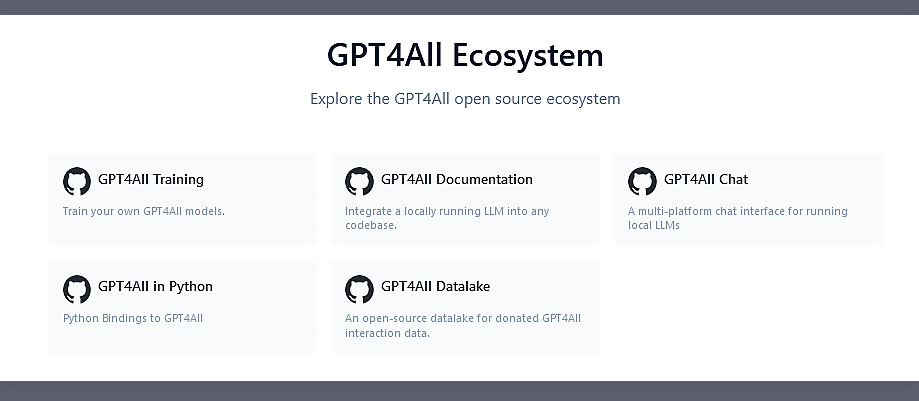
All in all, Gpt4All is a great, continually improving project to get into if you’re all about utilizing compatible free, open-source large language models available online, locally on your system. It gives you access to many setting tweaks and ensures the absolute privacy of your conversation data, which is what all of the local LLM inference software strives for.
If all this sounds interesting to you, don’t hesitate and try out Gpt4All by downloading their one-click installer straight from their official website. Enjoy!
